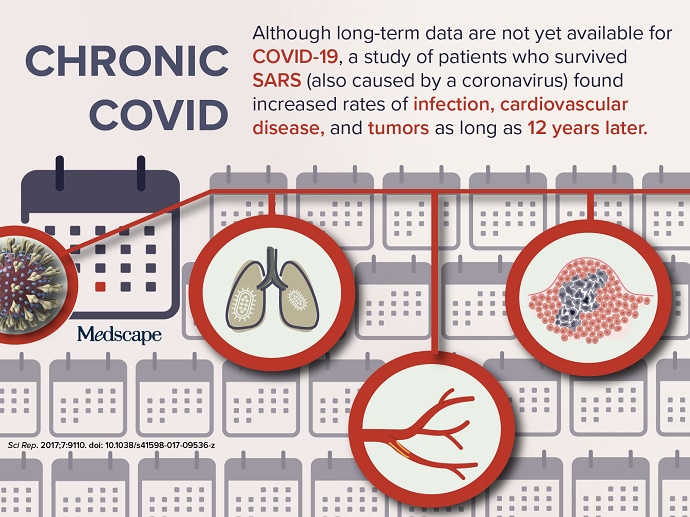Trending Clinical Topic: Chronic COVID
Each week, we identify one top search term, speculate about what caused its popularity, and provide an infographic on a related condition. If you have thoughts about what's trending and why, share them with us on Twitter or Facebook. Find the latest COVID-19 news and guidance in Medscape's Coronavirus Resource Center.
As the pandemic rages on, attention has begun to focus on patients who have had symptoms of COVID-19 or who have tested positive for months, as well as the prolonged recovery of those with serious illness. Recent reports have detailed so-called "long-haulers": individuals who have had active and significant symptoms associated with coronavirus infection for several months. Some patients have described being bed-bound for as long as nearly 3 months. Others no longer exhibit significant symptoms but still test positive for COVID-19 many weeks later, prompting questions about potential reinfection.
Whether those who feel recovered but still test positive for COVID-19 on PCR are still infectious remains unclear. A study from South Korea of 285 patients with COVID-19 who tested negative and were then removed from isolation, only to test positive again, found that none transmitted the infection after reverting back to positive. Meanwhile, a small German study of nine persons with COVID-19 found that the virus collected from patients after 8 days of illness didn't grow in culture. The authors suggest that patients with fewer than 100,000 viral RNA copies/mL of sputum 10 days after symptom onset have "little residual risk of infectivity." Understandably, both doctors and patients still have many questions about what appears to be chronic infection may mean.
The prolonged recovery of those hospitalized with severe COVID-19 has also been well-documented. Numerous small studies in Hong Kong and China have promoted speculation about possible long-lasting damage to lungs and other organs. Although the exact long-term consequences of severe COVID-19 are unclear, experts suggest that diffuse alveolar damage in some patients can progress to bronchiolitis obliterans organizing pneumonia (BOOP). Aggressive steroid treatment can prevent long-term damage associated with BOOP. A variant of this condition, acute fibrinous and organizing pneumonia (AFOP), is also a concern.
Although considered to be an acute illness, the long road to recovery for many more closely resembles a chronic condition. Beyond the respiratory system, lasting effects on digestive system, heart, kidneys, liver, brain, nerves, skin, and blood vessels are being monitored. That's not to mention the potential long-lasting mental health implications, which have been reported by many.
"Chronic COVID-19" is not an officially recognized designation by the World Health Organization or the Centers for Disease Control and Prevention. However, the term encompasses the growing concern about both patients with long-lasting symptoms or persistent positive test results and those patients with prolonged recoveries, making it this week's top trending clinical topic.
Read more clinical information about COVID-19.
